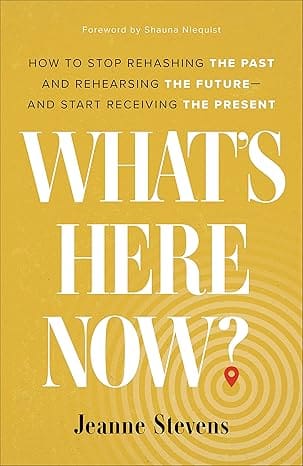- Home
- Spiritual Life
- Recognizing Shame

Recognizing Shame
 Excerpt taken from Chapter 2 “Shame Who Told You?” of What’s Here Now?: How to Stop Rehashing the Past and Rehearsing the Future—And Start Receiving the Present by Jeanne Stevens
Excerpt taken from Chapter 2 “Shame Who Told You?” of What’s Here Now?: How to Stop Rehashing the Past and Rehearsing the Future—And Start Receiving the Present by Jeanne Stevens
Recognizing Shame
When your insides don’t match your outsides, and when there are so many categories flying through your mind of what you should be that keep you from who God created you to be, you can be certain that an invisible shackle of shame has wrapped itself around your ankles. It is dragging you out of the present to try to fight your past with the very thing that will never be able to defeat it: more shame.
Shame is an invisible villain. You can’t see it, but you feel it every time it invades the present moment. Many times the words shame and guilt are used synonymously. But they are different.
Guilt says I made a mistake.
Shame says I am a mistake.
Guilt and shame are certainly not the most popular of feelings. They have never been crowned king or queen of the emotional homecoming court. But they each have a different effect on our lives. Healthy guilt from mistakes we’ve made can lead us to conviction and change. But shame feels like a storm cloud that rolls into our lives and permeates every part of our being, causing us to believe that we are a mistake.
Shame can come from
• things you’ve done or things done to you
• things you’ve said or things that have been said to you
• something that occurred last week or something that occurred decades ago
• unemployment or unprocessed grief
• divorce or depression
• addiction or uncontrollable anger
Shame is something we all experience at some level, from slight embarrassment to deep regret and humiliation. Shame lurks in the dark and has the power to destroy the human mind, heart, and soul because it alters our neuropsychological state every time we experience it.1
The impact of shame eclipses any simple definitions we try to give it.
• I could say that shame lives in phrases like, “I’m not smart enough,” or “I will never measure up.” And that would be true.
• I could say that shame lives in feelings or sensations that arise when a painful memory flashes through your consciousness. And that would be true.
• I could say that shame shows up in bedrooms and closets and bathrooms every time you catch yourself in the mirror and begin to think self-condemning thoughts. And that would be true.
All those experiences and so many more lead to shame’s powerful presence in our thoughts. Shame can embed itself into the essence of our human experience, and when given permission it will always leave us isolated, condemned, and believing we are unworthy of love.
A while back I was speaking at a conference and ran into someone I hadn’t seen in many years. I had been her son’s youth pastor, and Jarrett officiated her son’s wedding. I was thrilled to see her, and asked, “How is your son?” The first thing she said was, “Well, he married the wrong person. He’s walked away from God, and his life is a total disaster.”
Before I could respond, her condemnation continued. “I mean, he’s happy, but I don’t even know who he is, and I’m pretty sure he’s ruined his life.” I could feel the judgment and shame in her voice, and while listening to her I felt my anger rising. It took every molecule of self-control in my body not to speak up, and I thought, God, there are a lot of things I want to say, and I’m pretty sure they are not the same things you want me to say.
So I kept my thoughts to myself, and I kindly tried every social cue I knew to exit the conversation. I physically backed myself away from her as I said, “Well, I am so glad we ran into one another.” But she leaned in and continued talking, shoveling more and more shame onto her son until I just couldn’t listen anymore. I respectfully interrupted her and said, “I wonder if you would be open to some of my thoughts.”
Oh no, what had I done? I was trying to get out, but before I realized it, I’d stepped in deeper.
She said, “Oh, yes, Jeanne. I’ve always appreciated your wisdom.” I thought, I don’t think you are going to think I’m very wise ever again, but I said, “I’m glad I ran into you, and I am not sure this is what you want to hear, but your son needs your love, not your judgment. Shaming him is going to cause him to run from you, but loving him just might be the thing that opens his heart up to you. I wonder what it would look like if you found joy in being your son’s mom instead of his judge.”
These were not the words she expected. I could tell she was looking for me to jump on her bandwagon of condemnation, and when I didn’t take the bait her eyes widened in surprise. I assured her of my love for her and her son, and I wished her well before lovingly leaving the conversation.
Shame has a simple goal: to get you to believe you are unworthy of love. Shame will use any available tool to demolish the hope that transformation is possible. I love the way Brené Brown describes the impact of shame on the human soul. She says, “Shame corrodes the very part of us that believes we are capable of change.”2
Shame says this is as good as it gets. You are going to live this way for the rest of your life, and your past will always define your present. Shame is devoted to making sure that when you ask What’s here now? you never get to the answer. Shame wants to take you back and lock you up in your previous experiences so you can’t even feel what is happening in the now.
Shame is not a new problem, but at one point it was an unknown experience for humans. All the way back in the garden of Eden, the Bible tells us, “Adam and his wife were both naked, and they felt no shame” (Gen. 2:25).
It’s pretty easy to pay attention to the physical state of Adam and Eve: they were naked. Hello, whoever said the Bible was boring? Good for them. But it’s not just their physical state that gets a mention. The emotional state of Adam and Eve is even more important and is clear: they felt no shame. Any number of emotional descriptors could have been used at this moment.
• They felt no fear.
• They felt no anxiety.
• They felt no worry.
God could have used any number of adjectives, but he wanted it made clear they had no shame. They didn’t even know the feeling. They had never even entertained the thought or the lie that shame most wants us to believe: there must be something wrong with me. God knows the impact shame can have on our lives; I think that’s why he never intended for you and me to experience it.
If you know the story, you know that Adam and Eve, who felt no shame, decided to do the one thing God asked them to not do. They took the fruit from the tree in the center of the garden, and in an instant shame entered their world—and our world. The Bible says “Then the eyes of both of them were opened, and they realized they were naked; so they sewed fig leaves together and made coverings for themselves” (3:7). Soon after, Adam blamed Eve for making him eat the fruit, which is the first recorded moment of a man blaming a woman for all his problems, and for the first time they hid from God. Blame, shame, and hiding, never part of their lives before, instantly took over.
They hid because of their shame, but God went looking for them.
But the Lord God called to the man, “Where are you?”
He answered, “I heard you in the garden, and I was afraid because I was naked; so I hid.”
And he said, “Who told you that you were naked? Have you eaten from the tree that I commanded you not to eat from?” (vv. 9–11)
What a profound and beautiful question God asks: Where are you, and who told you these lies that you now believe about yourself? I love God’s playfulness at this moment. Let’s be honest; it isn’t as if God can’t see them and doesn’t know where they are. God always wins at hide and seek. But I am so moved by his goodness. The heart of God wants to know, At what point did you believe the lie that this is who you are? God ever so gently tries to draw Adam and Eve into the present by lovingly whispering, What’s here now? He sees that what just happened in their immediate past is keeping them from being in the present. The peace of God is always in the present, so if we aren’t in the present, we will not experience God’s peace or his presence.
What happened in the garden that day began a pattern of elevating the voices, stories, and experiences in our lives above what God says about us. God knows that when shame is present, we run from his presence. Shame is not what God designed. But shame is what so many of us have learned to put on in our lives. Every time we do, we leave the power of the present moment and lock ourselves up in the past. We condemn ourselves and our present lives and any future hope of who we might become.
…
Order your copy of What’s Here Now?: How to Stop Rehashing the Past and Rehearsing the Future—And Start Receiving the Present by Jeanne Stevens
Trending Now
Sign up today for your Inspiration Today Daily Newsletter
Supercharge your faith and ignite your spirit. Find hope in God’s word. Receive your Inspiration Today newsletter now!
Jeanne Stevens
Jeanne Stevens is the founding and co-lead pastor of Soul City Church in Chicago, one of America's fastest-growing urban churches. Prior to starting Soul City Church, Stevens was on the pastoral staff at Willow Creek Community Church and North Point Community Church. A sought-after speaker, leader, and writer, Jeanne's passion is to help people wake up to their purpose as they pursue a life of wholehearted freedom. She lives in Chicago with her husband, Jarrett, and their two children. Learn more at jeannestevens.com
Related Articles
February 26, 2026
Chased by God’s Blessings—How to Attract God’s Blessings and Walk in His Favor
The key to God’s amazing turnaround plan for you to walk in His favor in every area of life. Have…
February 25, 2026
Finish Strong with a Kingdom Mindset
For if you keep silent at this time, relief and deliverance will rise for the Jews from another…
February 23, 2026
The Joy of Being His Workmanship
When life urges us to strive harder and do more, Scripture invites us to rest in a freeing truth:…
February 20, 2026
Stepping Out in Faith When God Calls You to the Impossible
Stepping out in faith often feels uncomfortable—especially when God calls you toward something that…
Next Steps To Strengthen Your Walk
Inspiration Today Newsletter
Supercharge your faith and ignite your spirit. Find hope in God’s word. Receive your Inspiration Today newsletter now!
Christian Articles
Find articles to strengthen your walk and grow your faith. We have a wide range of topics and authors for you.
Submit A Prayer Request
We are here for you. Simply click on the button below to reach us by form, email or phone. Together we will lift our hearts and voices with you in prayer.





